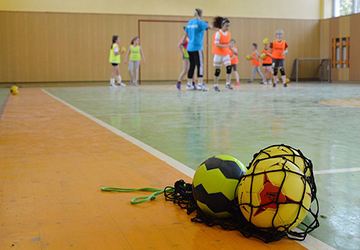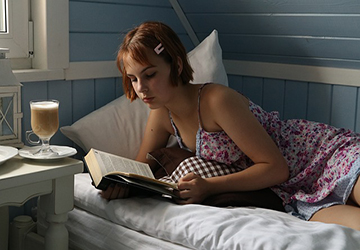A good night's sleep is vital for our physical and mental well-being. Maintaining good sleep hygiene and adequate sleep can be difficult for many people for various reasons. Getting the essential 7-9 hours of sleep per night can be challenging if you have insomnia. Improving your sleep hygiene is essential for a healthy night's sleep.
Poor sleep hygiene, which includes habits and practices that hinder sleep, can significantly contribute to sleep problems and other central and minor health issues. In this blog, we'll discuss some helpful tips and tricks for better sleep hygiene so you can enjoy a restful night's sleep.

Establish a Consistent Sleep Schedule
Maintaining a regular sleep schedule is an essential part of good sleep hygiene. It can aid in regulating our body's natural sleep-wake cycle, easing fall and staying in deep slumber. Establishing a consistent sleep schedule is critical to improving your sleep hygiene.
It's essential to set a fixed bedtime and wake-up time and adhere to it, even during weekends and holidays. Training our body to recognize the appropriate time to sleep and wake up can improve sleep quality and overall health. Remember that your body may require some time to adapt to a new sleep schedule.
Create a Relaxing Sleep Environment
One of the best tips for better sleep hygiene is establishing a calming environment to promote healthy sleep habits. The bedroom should be suitable for optimal sleep quality, not too cool or hot, dark, and quiet. To ensure a good night's sleep, consider using blackout curtains or an eye mask to eliminate light disturbances. Earplugs or a white noise machine can be used to minimize noise disruptions. The mattress and pillows should be comfortable and supportive, just to your liking.
Limit Screen Time Before Bed
Blue light emitted by electronic devices such as smartphones, tablets, and computers can disrupt our body's natural sleep-wake cycle. If you are working on improving your sleep hygiene, you need to reduce screen time before going to bed. It is recommended to stop using any screen at least two hours before bed, and this allows your body to relax and prepare for a good night's sleep.
Engage in relaxing activities such as reading a book, taking a warm bath, or practicing deep breathing exercises to promote relaxation and restfulness.
Practice Relaxation Techniques
One of the most excellent tips and tricks for better sleep is relaxation techniques. These are effective ways to reduce stress and promote relaxation, leading to better sleep hygiene. Deep breathing, meditation, and progressive muscle relaxation are popular relaxation techniques you can incorporate into your bedtime routine.
Deep breathing exercises help you calm down and regulate your breathing, making it easier to fall asleep. Meditation focuses on the present moment, which can help alleviate stress and anxiety. Progressive muscle relaxation involves tensing and relaxing each muscle group in your body, releasing any tension built up during the day. These techniques can be practiced individually or in combination to create a relaxing bedtime routine.
Avoid Stimulants
To improve your sleep hygiene for the better, it's essential to be mindful of the stimulants you consume. Caffeine, nicotine, and alcohol are all known to harm peaceful sleep, so limiting your intake is best to ensure a good night's rest.
It is advisable to avoid consuming these substances, particularly near bedtime, as they can interfere with your ability to fall and stay asleep. Consider trying a soothing herbal tea or a warm glass of milk as a substitute.

Exercise Regularly
Incorporating regular physical activity into your routine can positively affect your overall well-being and sleep quality. Research has indicated that individuals who exercise regularly are likelier to experience improved sleep quality and increased daytime alertness. Timing your exercise routine correctly is important to maximize its benefits.
However, you must avoid exercising too close to bedtime as it can stimulate your body and make it difficult to fall asleep. Experts recommend completing your workout at least three hours before bed and scheduling your exercise routine in the morning or early afternoon. By allowing your body to wind down before bedtime, you can reap the energizing benefits of exercising better.
Avoid Eating Heavy Meals Before Bed
Consuming a substantial meal close to bedtime may cause uneasiness and digestive issues, ultimately affecting sleep quality. It is advisable to consume important meals at least 2-3 hours before sleeping to have sufficient time for digestion.
A lesser-known tip for better sleep hygiene is to have a light snack before bedtime, as going to bed hungry can also disrupt sleep. When selecting foods, opt for those that are gentle on your digestive system. For instance, you could go for a small serving of cereal with milk or a slice of toast with peanut butter.
Use Sleep Aids Wisely
While sleep aids can be useful in promoting sleep, it is crucial to use them with caution. Some sleep aids can be habit-forming, and prolonged use may affect sleep quality. If you are considering using a sleep aid, it's crucial to consult your doctor and follow their recommendations. They can recommend a suitable sleep aid to help you sleep better without interfering with your health. Sleep aids should only be used as a short-term solution and should not be relied upon as a long-term solution for sleep problems.
Conclusion
Getting a restful night's sleep is crucial for maintaining our overall health and wellness and staying active the next day. Sleep hygiene can improve sleep quality and make you feel refreshed and energized upon waking.
Follow the tips for better sleep given in this blog. These are all the important factors to consider for a good night's sleep. Good sleep hygiene is essential for improving your quality of life and overall health.




